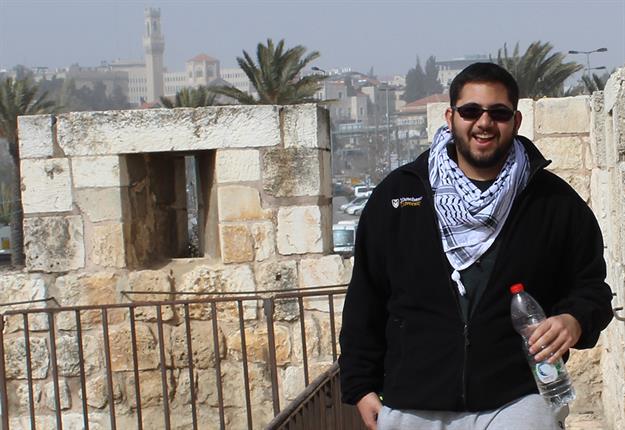
Palestine and Manchester: Making connections
What is the current situation in Palestine? What is the historical context of this conflict? What are the connections between Manchester University and Palestine?
On April 27, Lucas Al-Zoughbi, a senior peace studies and psychology major from Bethlehem, Palestine, will lead a discussion exploring the history that Manchester shares with Palestine.
He will also briefly discuss the history of the Israeli-Palestinian conflict and share personal stories about growing up under military occupation, including circumstances surrounding the arrest of his father and how the late Manchester Professor Ken Brown aided his release.
"Conflict Transformation in Palestine" is 3:30 p.m. Thursday, April 27, in Cordier Auditorium on the North Manchester campus. It is free and open to the public.
In the late 1980s, Brown took a group of students on a study trip to Palestine. Al-Zoughbi’s father acted as a tour guide for Brown and his students. He led them through the Dheisheh refugee camp in Bethlehem, where they were captured by Israeli soldiers. Brown and his students were forced to leave the country and Al-Zoughbi’s father was arrested and unjustly imprisoned.
Back in the United States, Brown tapped into the power of nonviolent resistance by starting a letter-writing campaign in a bid to get Al-Zoughbi’s father released. He sent a barrage of letters to the unit where Al-Zoughbi’s father was being detained, and this consequently prompted his release. A peace studies professor and activist, Brown was also Al-Zoughbi’s mother’s professor at Manchester.
“This is the power of nonviolence,” Al-Zoughbi said. “It is innovative … you come up with different ways (to resist), and you never know how things will turn out. Persistence will gain you power.”
“My father has been involved in nonviolent resistance and is very outspoken about the human rights violations in Palestine,” Al-Zoughbi said. His father founded the Wi’am Palestinian Center for Conflict Transformation in Bethlehem. It’s a grassroots organization focused on conflict resolution training and re-empowering Palestinians. A sniper tower overlooks the center, and people who go there often experience tear gas and military raids.
The Palestinian-Israeli conflict began in 1948, when Israel became a country. “In the process of Israel becoming a country, it essentially ethnically cleansed approximately 800,000 Palestinians from what became the state of Israel,” Al-Zoughbi said. “There was a huge refugee crisis, internal displacement, external displacement as well as a couple of massacres. At that point, around 530 Palestinian villages were completely eradicated.”
The Israeli army arrests and detains between 500 and 700 children, under the age of 17 every year, he said. “One of my good friends was arrested when he was 15. He had attended a nonviolent protest and that night, [the Israeli soldiers] kidnapped him.” He resurfaced six months later but was traumatized because of the waterboarding and severe beatings by the Israeli soldiers.
Al-Zoughbi will also share pieces of literature and music that are part of Palestinian culture.
His presentation is part of the Values, Ideas and the Arts program at Manchester, designed to offer academic credit to undergraduate students who, through the process, gain cultural exposure, artistic experiences and intellectual enrichment. This presentation is part of the VIA Senior Series, which invites MU seniors to propose a topic of their choosing.
-30-
Prepared by Karen Kanyike, Strategic Communications student worker at Manchester University.
About Manchester University
Manchester University, with campuses in North Manchester and Fort Wayne, Ind., offers more than 60 areas of academic study to 1,600 students in undergraduate programs, a Master of Athletic Training, a Master of Pharmacogenomics and a four-year professional Doctor of Pharmacy. It has students from 20 nations and is home to the world's first undergraduate peace studies program, established in 1948. Learn more about the private, northern Indiana school at www.manchester.edu.
April 2017